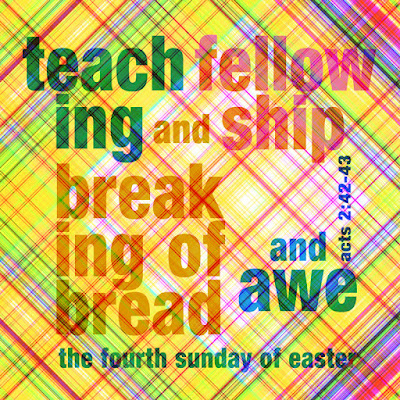breaking of bread and awe
Acts 2:42-43
Acts 2:41 -47
41 they gladly received the word Peter preached and three thousand were baptized on that day!
42 They devoted themselves to the apostles' teaching and fellowship, to the breaking of bread and the prayers. 43 Awe came upon everyone, because many wonders and signs were being done by the apostles. 44 All who believed were together and had all things in common; 45 they would sell their possessions and goods and distribute the proceeds to all, as any had need.
46 Day by day, as they spent much time together in the temple, they broke bread at home and ate their food with glad and generous hearts, 47 praising God and having the goodwill of all the people. And day by day the Lord added to their number those who were being saved.
Season and Day
A week of weeks, 7x7, Easter fills about 1/7 of the calendar year. The fiftieth day of Easter is the Day of Pentecost, the third of the church's Trinitarian festivals. At Pentecost we hear about people assembled in Jerusalem for the Jewish Pentecost to celebrate the wheat harvest along with God's gift of the Ten Words of the Sinai Covenant.
Every year the Fourth Sunday (day 22) of Easter is Good Shepherd Sunday with Psalm 23 as its centerpiece. We sing and hear at least one or two settings of Psalm 23, the Shepherd Psalm. Do you have a favorite hymn version, maybe a hymn-based or freeform anthem?
Luke Volume 2: Acts
During the rest of the church's year of grace the first reading comes from the Old Testament, but for Sundays of Easter, it's from the Acts of the Apostles. That's particularly apt because Acts brings us the paradigm-upending, life-transforming activities of the newly birthed church. Hearing from Acts every Sunday also is a bit ironic because the lectionary hasn't yet given us the Day of Pentecost account from Acts 2 that describes the Holy Spirit filling the world accompanied by sensory signs of wind and fire.
Luke's gospel emphasizes the Holy Spirit, carefully places everything in history, focuses on women and other marginalized populations, loves prayer, is really big on sharing meals. In his Acts of the Apostles, Luke continues in the same direction.
The lectionary selection formally begins by describing the Christian community, but it follows 2:41 that tells about the baptism of 3,000 people! This happens after Peter's sermon in Acts 2:14-41. Working Preacher's tagline insists, Good Preaching Changes Lives. You can describe what follows as a blueprint for ways to live out our baptism—how, then, shall we live baptized?
You know some of it: work for justice; defy empire; be God's shalom; practice resurrection. Be kind to planet earth. Be radically hospitable and love without reservation. Praise and thank God, because anything we do is the work of the HS and not our own.
Content and Context
You know about the distinction between real and ideal? Most scholars assume Acts records some events as they really happened and includes others that could show up when the Holy Spirit shows up. The title of one of Jürgen Moltmann's books is The Church in the Power of the Spirit [link to my blog and review]. The church – that's us! – still lives, breathes, serves, and hopes in the power of the pentecostal spirit of life, the spirit of resurrection.
"They devoted themselves to the apostles' teaching and fellowship, to the breaking of bread and the prayers. Awe came upon everyone…" Acts 2:42-43
Reading and interpreting scripture, gathering with others, food, and prayer. Most scholars agree "breaking of bread" refers to the Lord's Supper, probably in what looks to us like a home church. But without a doubt it also means routinely sharing vittles so no one has too much or too little, everyone has enough.
2:44 "all who believed were together and had all things in common."
Common ownership of goods and assets, selling stuff to provide for those in need may seem way out there beyond ideal. Even if we've done some anthropology field work or ministered in non-mainstream settings, most of us still tend to interpret scripture from a contemporary western viewpoint. However, in some rural communities and in many less-developed countries, fluid ownership of everything – "what's mine is yours as long as I don't need it right now and you do" – isn't uncommon.
Related to the real and the ideal, later in Acts Luke writes about discord, persecution, disagreements, fractured relationships, things not going well. All in all, he presents not only an ideal, but wisely brings up real situations that need resolution.
Koinonia is the Greek word often translated as fellowship, and our multiple meaning English word "common" comes from koinonia: routine, mundane, commonplace, ordinary (also with meanings of well-arranged, organized), jointly held… a common-wealth.
Where We Live
teaching – fellowship – breaking of bread – prayers – awe – all things in common
How well does today's reading describe church as you've experienced it?
• In your current context?
• Other churches you've attended or where you've been involved?
• Churches you've read about?
• The church you dream of?
• The church you're going to plant and establish?

No comments:
Post a Comment